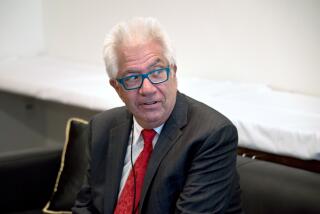U.S. diplomat draws on Asian tradition to address problems in Asia
- Share via
BEIJING — It’s a familiar plot line: A young man, searching for answers, turns to an Asian martial arts master for wisdom and the skill to fight off bad guys.
Years ago it was the theme of Hollywood’s “Karate Kid” and a TV series, “Kung Fu.” It was also, it turns out, part of the early life of the Obama administration’s top diplomat for East Asia.
Daniel R. Russel, the assistant secretary of State for East Asian and Pacific affairs, began learning about Asia 38 years ago when he followed a martial arts master to a remote corner of Japan for three years of study in the discipline of aikido.
He came away, he said, with an approach to problem-solving that he uses now in representing the United States in a region brimming with economic opportunity and potential conflict.
“It really changed my life,” said Russel, 60. “And it really is a part of my diplomatic life as well.”
According to the State Department, Russel helped formulate President Obama’s so-called strategic rebalance to Asia. The White House hopes the shift will strengthen alliances, expand cooperation with emerging powers, boost the U.S. economy and win legacy points for the president.
Russel’s influence was clear last week when he accompanied Secretary of State John F. Kerry to China, South Korea and Indonesia. And it will be key when Obama travels to Japan, South Korea, Malaysia and the Philippines in late April.
A New York native, Russel studied classical Greek and philosophy, not Asia, when he was an undergraduate at Sarah Lawrence College. But his focus changed soon after when, drifting through California, he happened to see an aikido master class taught by the discipline’s leading practitioner.
Russel, then 22 and shaggy-haired, was fascinated by the master’s skill and grace. When the teacher consented to take him on as a pupil at the dojo, or training hall, Russel spent all his cash on a one-way ticket to Tokyo for his new life in Japan’s equivalent of the Ozarks.
He is now a skilled Japanese linguist. But he had to learn the language the hard way — phrase by halting phrase. The aikido academy didn’t offer language instruction.
Developed in the 1920s, aikido blends martial arts, philosophy and religion. It’s suitable for diplomats since the goal is to avoid actual combat. The practitioner tries to redirect an attacker’s energy to avoid injuring himself or his opponent.
“It’s the physical equivalent of persuasion,” said Russel, who earned a second-degree black belt.
Russel, a compact, soft-spoken man with a ready smile, says he’s never had to fight off a real attack. He’s confident he could if he needed to.
Russel joined the U.S. foreign service “on a lark” in 1985, at age 31. He held a series of Asia-related posts, including as assistant to then-U.S. Ambassador to Japan Mike Mansfield and Asia advisor to the U.S. Mission to the United Nations.
He filled up a Rolodex with contacts working at posts in Japan and South Korea. Russel, whose wife is Japanese, has adopted many Asian ways.
While in sweltering Jakarta, Indonesia, last week, he pulled out a folding hand fan to prove what the Japanese and Chinese have known for centuries. “They really work,” he said.
During Obama’s first term, Russel was the president’s top White House advisor on East Asia and impressed top White House foreign policy aides as well as former government officials.
In a telephone interview, former Secretary of State Henry Kissinger, who compares notes on Asia with Russel, described him as “extremely knowledgeable,” a “professional without a particular ideological bent.”
Kerry has jokingly called Russel “Buddha” for his unflappability amid diplomatic storms.
Being point man on Asia will test his cool. Half a dozen countries are at odds over resource-rich islands in offshore waters, forcing U.S. officials to try to separate rivals who don’t always listen to U.S. advice.
Russel says threats of war are overstated. “While there’s an uptick in tensions in the region, it’s not a harbinger of war.... This is not a rolling boil.”
Still, as Kerry was urging Japan and South Korea to set aside a historic legacy of distrust, Japanese Prime Minister Shinzo Abe denounced as “serious slander” South Korea’s criticism of Japan’s treatment of Korean “comfort women” during World War II.
In Beijing, China pushed back on Kerry’s request that it take a new approach to its maritime disputes with Japan, South Korea, Vietnam, Malaysia, Brunei and the Philippines.
The Obama administration has faced criticism from some members of Congress that it has been too accommodating to China and not strong enough in support of Japan.
But this month, Russel bluntly called out Beijing for using questionable historical maps to claim a string of uninhabited islands and shoals with undersea oil reserves that also are claimed by Japan.
The claims appeared “an incremental effort by China to assert control” despite Japan’s objections, and despite the lack of “any explanation or apparent basis under international law,” Russel told the House Foreign Affairs Committee.
China responded that Russel was siding with its rivals and meddling.
But the testimony, described by some as a diplomatic coming-out for Russel, won him points with critics who have urged the White House to take a firmer line with China.
“It was a good statement — it’s getting him high marks,” said Michael Green, a former top Asia advisor to President George W. Bush who is now at the nonpartisan Center for Strategic and International Studies.
More to Read
Sign up for Essential California
The most important California stories and recommendations in your inbox every morning.
You may occasionally receive promotional content from the Los Angeles Times.











